Can I put a hot pot directly onto a concrete kitchen counter?
Concrete is heat-resistant but is subject to thermal shock if a red-hot object is placed
directly upon it. The exposed area may flake or chip away if too much heat
is applied. In addition, the heat could damage the sealer and wax applied to the
concrete surface.

What are my color choices?
Endless! Most companies offer a base color pallet of a dozen colors plus other colors with a variety of patinas and stains to choose from. Tumbled glass and two-toned concrete is also common for countertops. Other items such as embedded stone, glass, or other objects can be added to specialize your countertops to your specific style and taste. You can specify the color, size and density of embedments.
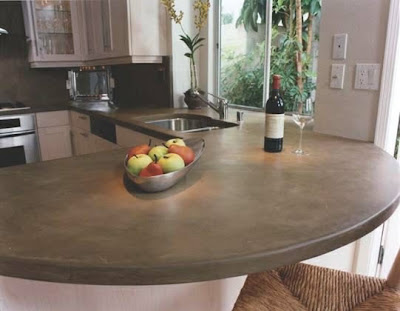
How much do concrete counters cost?
Even though it is a completely custom material, concrete is competitive in price with standard countertop materials. The price is competitive with high-end granite, ranging from $75 to over $100 per sqft.

Will concrete chip?
As with any day-to-day used surface, there is always the possibility of chipping. Concrete corners and edges can chip if struck by a hard object. Sealing and rounding the inside corners of a concrete mold, or form, with silicone will ease the edges and prevent chipping. An eased concrete edge is much less likely to chip or flake than a sharp edge.
Will concrete stain?
Bare concrete is very porous and will easily stain. Virtually all concrete countertops are sealed to prevent staining. Staining can occur if the sealer is compromised (for example: cutting on or setting a hot pan on the surface).
How do we make concrete countertops?
Most companies produce concrete countertops that are pre-cast/built in their shop. They use cement, aggregates, additives and reinforcement materials. After the countertop has cured they perform a finished product that the client desires. Once the look and beauty is achieved to the clients liking the sealing process begins.
Will concrete scratch?
While the sealer is durable, it can scratch if cut with a knife or subjected to heavy, sharp objects dragged across the surface. Cutting on the concrete may compromise the integrity of the sealer and allow stains to permeate the concrete matrix. If you do scratch a countertop, you can easily repair it yourself using a water-based polyurethane to reseal the scratch.


What edges are available?
For concrete, edging is formed and cast rather than cut like granite or solid surface. Therefore, edge choices depend on the manufacturer doing the job. The edging options for concrete countertops are almost endless.

How does pricing of a Quartz surface compare to other natural stone or solid surface products?
Generally, Quartz surface pricing is similar to mid to high range priced granite and other high-end countertop options.
 What are the benefits of using Quartz surfaces?
What are the benefits of using Quartz surfaces?Consistency– Quartz surfaces are far more consistent in color from slab to slab and within each slab than a natural stone like granite or marble.
 Does a Quartz surface withstand heat? Can I put a hot pan or pot on it?
Does a Quartz surface withstand heat? Can I put a hot pan or pot on it?Just like natural stone, Quartz surfaces are resistant to heat. However, any natural stone surface can be damaged by sudden and rapid change of temperature.
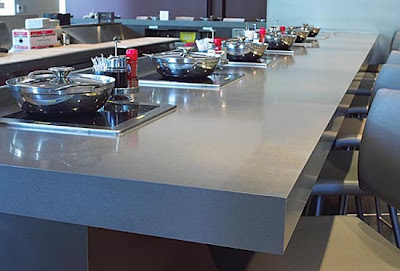 Are fissures, “pock marks”, and other similar features associated with certain granite colors present in Quartz?
Are fissures, “pock marks”, and other similar features associated with certain granite colors present in Quartz? No. Due to the manner in which the Quartz slabs are manufactured, such characteristics as fissures and pock marks are virtually non-existent.
 Is a Quartz surface made or manufactured in a plant?
Is a Quartz surface made or manufactured in a plant?Yes, Quartz surfaces are produced in manufacturing facilities around the world. Natural Quartz mined out of the Earth is combined with a small percentage of pigment and resin to create the final product.
 Quartz vs. Granite and Marble Countertops- How do the three surfaces compare?
Quartz vs. Granite and Marble Countertops- How do the three surfaces compare?With a Quartz surface, you get the look and feel of natural stone with a far greater degree of strength and color consistency. Typically, Quartz surfaces lack the swooping veins and other movement characteristic of many granite and marble colors. Quartz is stain resistant without ever needing to be sealed, unlike granite and marble which needs to be sealed every 2 years. All these characteristics make Quartz surfaces ideal for residential countertops and all other food preparation settings.
 Is a Quartz surface considered a natural stone surface?
Is a Quartz surface considered a natural stone surface?Yes. A Quartz surface is comprised of 93% pure natural Quartz mined from the Earth.

What is granite?
Granite is defined as any igneous rock suitable for cutting and polishing. Granite’s are mineralogical aggregates, which change composition from one variety to another. Granite’s main components are colored feldspar, quartz and ferromagnesian minerals. All of these minerals are of a different composition, density and hardness, therefore no two pieces of granite are identical.

Why should I choose a granite countertop?
Of all the countertop materials, natural stone offers the most unique and striking colors and patterns available. Every other man made surface can only mimic the brilliance and beauty of natural stone. It is
recommended to reseal the granite countertops periodically every few years. This sealer does not make a granite countertop “stain resistant” but penetrates into the pores of the stone allowing more time to clean spills.
How do I clean my granite countertop?
Granite is a very durable stone. It is also harder than marble. Use a mild phosphatefree,
biodegradable liquid dish-soap, soap flakes or powder which contains no aromatics is recommended to clean the granite countertop, followed by a thorough rinsing and drying with cotton flannel or chamois.
Can my granite top be damaged?
Because of its crystalline structure, it can chip if subjected to sharp hard objects. Unsealed granite can absorb stains such as oil, which can ultimately cause dark spots or discoloration. Certain foods with citric, lactic, and vegetable acids such as oranges, milk, limes and tomatoes can strip the polish or etch the stone surface.
Can I cut on my Granite countertop?
Granite is harder than your knife blades and will dull them very quickly, therefore it is not recommended.
Do granite seams show?
Because granite is a natural stone and is mined from the quarry in blocks usually no more than 10’ long, you will most likely end up with seams. The visibility of seams will depend on the granularity, color and pattern and the skills of the installer. Seams in a small, uniform grain stone will not be as apparent as a larger varied grain stone. Seams in a dark colored stone will be less apparent than a light colored stone. A dramatic pattern with swaths of color will show more seams than a uniform patterned stone.
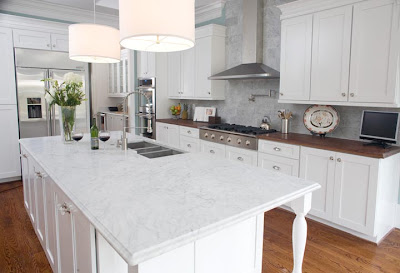 Is marble suitable for a kitchen countertop?
Is marble suitable for a kitchen countertop?Yes, sealing your marble is highly recommended.
Marble can be used for a number of various applications. Generally you can safely use marble in low-traffic areas.
Although typical application of marble is for the bathroom vanities, tub surrounds and fireplaces, it is also used in kitchens as countertops and back splashes. Marble is not used as often in kitchen environments like concrete and granite simply due to the fact that it is easy to scratch and is harmed by acidic substances, such as vinegars, ketchups, limes, etc.
Always use mild stone cleaners. Never use powdered cleansers to clean your stone. Never use acidic cleaners that include substance like ammonia.
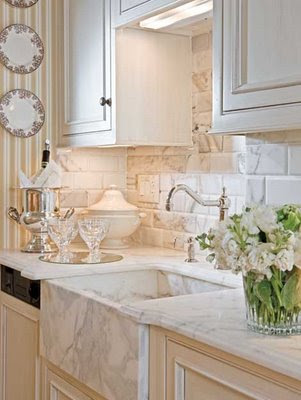

What is Corian®?
Corian® is the brand name for a solid surfacing material created by DuPont that has earned trust and respect as a proven material that brings design versatility, long-term performance and value to any environment. More than just countertops, Corian® lends itself to imaginative uses, innovative interpretations, and enduring applications. It can be cut, routed, drilled, sculpted, bent, or worked like a fine wood. The ever-evolving color palette now extends to more than 100 colors. If you can envision it, chances are you can create it with Corian®.
For more info on Corian, click here
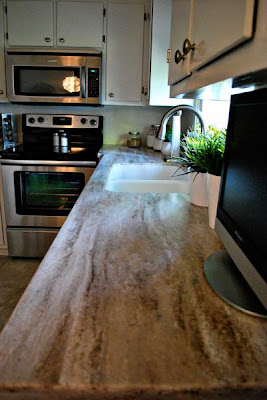
Is Corian® stain-resistant?
Corian® is stain-resistant. Because Corian® is nonporous, stains can't penetrate the surface, so it's easy to clean and maintain. Unlike natural stone, Corian® never requires sealing.
Is Corian® heat-resistant?
We do not recommend placing a hot pot directly on Corian®. Although Corian® remains stable and undamaged in temperatures up to 212ºF (100ºC), high heat or flame will damage your surface. In most cases, this damage can be repaired.
How do I clean my Corian®?
Corian® is easy to clean. Soapy water or an ammonia-based cleaner is all that is necessary for day-to-day care of your Corian®. Minor scratches, burns or discoloration are also easy to repair. Major damage should be repaired by a Certified Fabricator/Installer of DuPont Corian®.
Does Corian® require special sealing?
No, Corian® is nonporous. Unlike natural stone, Corian® never needs sealing making it easy to live with! Corian® is a beautiful, maintenance-free surface that you're sure to enjoy for many years to come.

What makes DuPont™ Corian® the perfect surface?
Corian® is easy to clean and is certified kosher. Because Corian® is nonporous, stains do not penetrate the surface. With proper cleaning, Corian® also resists the growth of mold, mildew and bacteria. Corian® is also heat and scratch resistant.






















